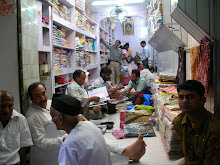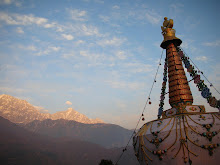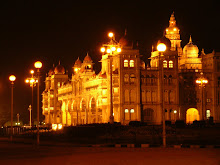Thursday, April 17, 2008
AND THE POST YOU'VE ALL BEEN WAITING FOR...
HOW TO SIT INDIAN STYLE:
1st: Take your shoes off
2nd: Abandon all sense of time
3rd: Forget about comfort
4th: Don't worry - pain is part of the process!
5th: Make small adjustments
6th: Persevere!
Don't worry, even if you lose all feeling in your lower extremities, it will return!
These instructions extend far beyond sitting. In fact, they are good tips for traveling to India from any angle (except you'll probably want to keep your shoes on in the streets) and for life in general!
I'm back in North Carolina today and WHAT A BEAUTIFUL SPRING IT IS IN SOUTHERN PINES!!! It's unbelievable. I'm sitting here in the kitchen overlooking the green grass and the blooming dogwoods and the clear reflection of the pinetrees in the lake right now... There's a red cardinal in the bird feeder... and mom made fudge brownie cupcakes. :)
It's so good to be home. Seeing my family again is such a blessing. I feel so fortunate and want to thank you all for your love and support. I can't wait to see you soon.
Most sincere, and thanks for keeping up with me here,
LOVE,
Jaye
Monday, April 14, 2008
Ajanta Caves
The Ajanta Caves comprise a world heritage site located about an hour and a half south of Jalgaon by bus, carved out of a smooth rock face that towers above a horseshoe bend in a now dry river. I woke up around 5:30 last Saturday morning in order to catch the 6am bus thinking that I would outsmart the sun and the weekend crowds by getting there early. It turns out that the caves didn't open until 9, but I was right there ticket in hand as soon as they did. From the first moment that I stepped inside the cool door of the first cave I felt as though I had just stumbled into a long lost inner sanctum. I thought of the wonders of Tulum and Chichen Itza and felt equally if not more inspired, because those are just memories to me now, and these caves were living, breathing rock still vibrating with the intensity of their impressions.
None of the caves were naturally existing- each one was carved from the ceiling to the floor from the rock mountain to create the vast halls and sacred spaces. Some of them were supported by as many as 40 internal columns and were adjoined by as many as 25 meditation cells. The caves comprised an ancient monastery, and to house the monks there were dorm-like accommodations, with 2 stone "beds" and a shelf to a 5x6 cell. Some even had the luxury of stone pillows.
In August, lush green foliage pervades the canyon, monsoon rains fill the river below and waterfalls run between the caves filling carved reservoirs. In April, however, 100+ temperatures outside berate the brittle landscape and the determined tourists (such as myself of course) forcing us to take refuge inside the caves where the temperature is impossibly cool and the dim light is easy on the eyes. Inside, some of the walls are covered with beautiful painted murals depicting the past lives of the Buddha in the form of the Jataka Tales. It's hard to understand where the light came from to allow such paintings to be born, but I quickly learned, thanks to a trusty guide who was disappointed with my 10 RS tip, that the wide open floors that you step down into when you enter the cave were filled and maintained with several inches of water to create a giant mirror-like surface to illuminate to caves. That must have been a sight to behold.
I can only imagine.
The Taj Mahal
Thursday, April 3, 2008
Thursday's Poem
Wednesday, April 2, 2008
Obama for President!

Thanks Chuck for sending me this letter!
Dear Mr. President:
The situation in Tibet is deeply disturbing, and requires that all of us, regardless of party, do what we can to try to influence it for the better. I understand that you discussed the subject on Wednesday with President Hu Jintao. The United States has many issues for which China's cooperation is important, including denuclearization of North Korea, ending Iran's nuclear program, stopping the genocide in Darfur, confronting repression in Burma, and combating global warming. However, it is important that we give high priority to the plight of Tibetans and make clear to President Hu that the way in which China treats all Chinese citizens, including Tibetans, profoundly affects how China is viewed in the United States and throughout the international community.
Resolution of differences between the Chinese Government and the Dalai Lama is the key to progress in Tibet. The Dalai Lama, as you have said, is "a good man." He is revered by virtually all Tibetans, and his absence from his homeland creates an incurable wound in the heart of Tibetan Buddhism. Tibet's unique cultural and religious heritage cannot be preserved if he is demonized and kept at arm's length. He has accepted Beijing's precondition for a solution, namely recognition that Tibet is part of China, and has clearly stated that he is seeking religious, cultural and linguistic protection and autonomy for the Tibetan people, not independence. More recently, he indicated his belief that despite recent events, the Chinese people deserve to host the Olympics this summer.
I hope you made clear to President Hu the American view about the importance of the following: a negotiation with the Dalai Lama about his return to Tibet; guarantees of religious freedom for the Tibetan people; protection of Tibetan culture and language; and the exercise of genuine autonomy for Tibet. That is the path to the stability and harmony that the Chinese leaders say they are seeking in Tibet.
In addition to your personal intervention with President Hu, there are other steps I hope you will take to highlight our concern. I support your call for the foreign press and diplomatic personnel to have free access to Lhasa and other Tibetan cities and villages to ensure that repression and human rights violations cannot escape the world's notice. Beijing has committed to the International Olympic Committee to allow foreign journalists free access to cover stories throughout China, including Tibet. We should hold them to that commitment. The U.S. and our democratic allies and friends should also urge the UN Human Rights Council to send an investigatory team to Tibet. China should be encouraged to allow the International Committee for the Red Cross to visit prisons in Tibet to ensure that detainees are not held under inhumane conditions, tortured, or mistreated.
Like you, I want to take steps that increase the chance of a negotiated solution between Beijing and the Dalai Lama, and that have the best chance of improving the lives of ordinary Tibetans. Therefore, I support your effort to aggressively use your relationship with President Hu to achieve these goals. Should it appear, however, that the Chinese are taking private diplomacy as a license for inaction or continued repression, I would urge you to speak out forcefully and publicly to disabuse them of the notion that they can thus escape international censure.
Despite the high emotions of the present time, I hope you can persuade the Chinese leadership that in this the year of the Beijing Olympics they have a unique opportunity to make dramatic progress in resolving the Tibet issue. Chinese leaders have it within their power to achieve that worthy goal if they take steps to change the situation in Tibet for the better and by reaching an accommodation with the Dalai Lama. Progress in Tibet would profoundly affect the world's perception of China as it prepares to host the Olympic Games in August.
Sincerely,
Barack Obama
United States Senator




































































































